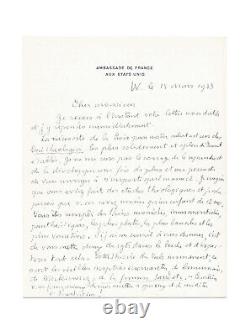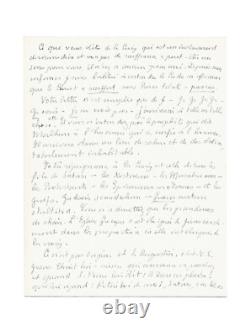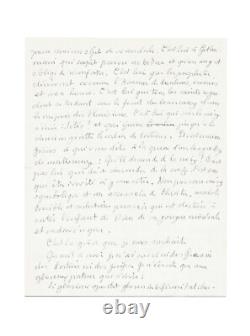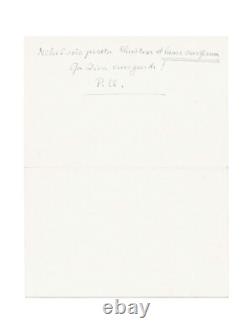
- Homepage
- Author
- Alfred Bruneau (3)
- Beydts (louis) (4)
- Camille Mauclair (3)
- Charles Monselet (3)
- Charles Wagner (3)
- Chateaubriand (5)
- Colette (3)
- Ernest Daudet (3)
- Eugène Labiche (3)
- Jean Couty (3)
- Jean-léon Gérôme (5)
- Louise Read (4)
- Marcel Proust (5)
- Paul Chabas (4)
- Paul Meurice (3)
- Proust (3)
- Roger Martin Du Gard (4)
- Salomon Reinach (3)
- Sully Prudhomme (7)
- Violette Leduc (4)
- Other (3998)
- Binding
- Era
- 18th Century (11)
- 1900 To 1960 (61)
- 1930s (4)
- 1960s (5)
- 1970s (7)
- 19th (5)
- 19th Century (48)
- 20th Century (15)
- Beautiful Era (12)
- Belle Epoque (49)
- First Empire (8)
- Nineteenth (19)
- Nineteenth Century (11)
- Post-war (21)
- Restoration (17)
- Revolution (4)
- Roaring Twenties (28)
- Second Empire (21)
- Second World War (5)
- World War Ii (9)
- Other (3713)
- Language
- Theme
- Type
Paul CLAUDEL / Signed Autograph Letter / Satan / Jews / Cross / Jesus / Bible






" [to Joseph Desclausais] W[ashington], March 15, 1933, 3 1/4 pages large in-8° in black ink. Letterhead of the French Embassy in the United States. A violent Christ-like attack from Claudel, carried away by an immoderate faith. I just received your undated letter and I am responding immediately.
The necessity of the Cross for our salvation is one of the most solidly and splendidly established loci theologici [term applied by Melanchthon to Protestant dogmatic systems and retained by many until the 17th century]. I do not have the courage to revisit and develop it once again and allow myself to refer you to any manual. I thought you had studied theology and I realize that you know less than a 12-year-old child. You are filled with monistic theses. Pantheistic, the strongest, most banal, and most vomitive.
If I have one piece of advice for you, it is to put two fingers in your mouth and expel all of that. Your theory of the immanent verb is simply the old, shallow nonsense of Lamennais, Mickiewicz, the woman [George] Sand, etc.How much better it would be for you to kneel and meditate on the Imitation [of Christ]! What you say about the Cross, which is an instrument of resurrection and not suffering, may have meaning for you, but it has none for me. Since my childhood, I have been accustomed to hearing the Creed affirm that Christ suffered under Pontius Pilate - passus. Your letter is filled only with J - J J J J - I believe - I do not believe - I will achieve such and such a thing, etc. And you do not hear the prophet who says: Woe to the man who trusts in man.
He will arrive at a place of desolation, totally uninhabitable. Your repugnance to the Cross is that of all the sons of Satan - the Nestorians - the Muslims - the Protestants - the modern Epicureans - and the Jews [.] You acknowledge only the greatness of a dog. The Greek Church has distanced itself from Jesus exactly in proportion to how it has distanced itself from the Cross. It is not S [aint] Augustine, N [our] S [avior] Jesus Christ himself who announces his passion, and when S [aint] Peter tells him: God forbid!
He replies: Get behind me, Satan, for you are a stumbling block to me [.] It is he whom the prophets describe as the Man of Sorrows, vernis and not homo [.] It is he who on the cross cries out: I thirst!] It is not he who must come down from the cross. It is you who are invited to ascend it.Not a symbolic cross from a theatrical accessory, but the terrible and salvific passion meant to bring the child of God out of his miserable and cadaverous gangrene. That is the grace I wish for you. As for me, I have not followed the Greeks, nor the Latins, nor the Jews. I listen only to my glorious fathers. Deeply influenced by Arthur Rimbaud and Thomas Aquinas, Claudel's work is profoundly marked by Christian faith, which he says he received as revelation on Christmas Day 1886.
On the sidelines of his diplomatic activities, he devoted the rest of his life to the study of biblical texts, transposed through his works and plays. A writer and recipient of the Academy Prize in 1937, Joseph Desclausais was an agent of Pierre Laval under the Vichy government. He was sentenced to four years in prison after the war for denouncing to the Gestapo.

